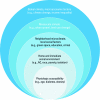Integrating climate change adaptation into public health practice: using adaptive management to increase adaptive capacity and build resilience
- PMID: 21997387
- PMCID: PMC3279431
- DOI: 10.1289/ehp.1103515
Integrating climate change adaptation into public health practice: using adaptive management to increase adaptive capacity and build resilience
Abstract
Background: Climate change is expected to have a range of health impacts, some of which are already apparent. Public health adaptation is imperative, but there has been little discussion of how to increase adaptive capacity and resilience in public health systems.
Objectives: We explored possible explanations for the lack of work on adaptive capacity, outline climate-health challenges that may lie outside public health's coping range, and consider changes in practice that could increase public health's adaptive capacity.
Methods: We conducted a substantive, interdisciplinary literature review focused on climate change adaptation in public health, social learning, and management of socioeconomic systems exhibiting dynamic complexity.
Discussion: There are two competing views of how public health should engage climate change adaptation. Perspectives differ on whether climate change will primarily amplify existing hazards, requiring enhancement of existing public health functions, or present categorically distinct threats requiring innovative management strategies. In some contexts, distinctly climate-sensitive health threats may overwhelm public health's adaptive capacity. Addressing these threats will require increased emphasis on institutional learning, innovative management strategies, and new and improved tools. Adaptive management, an iterative framework that embraces uncertainty, uses modeling, and integrates learning, may be a useful approach. We illustrate its application to extreme heat in an urban setting.
Conclusions: Increasing public health capacity will be necessary for certain climate-health threats. Focusing efforts to increase adaptive capacity in specific areas, promoting institutional learning, embracing adaptive management, and developing tools to facilitate these processes are important priorities and can improve the resilience of local public health systems to climate change.
Conflict of interest statement
J.H. serves as a consultant for the CDC. The other authors declare they have no actual or potential competing financial interests.
Figures


References
-
- Argyris C, Schön D. Reading, PA: Addison-Wesley; 1978. Organizational Learning: A Theory of Action Perspective.
-
- Armitage D, Marschke M, Plummer R. Adaptive co-management and the paradox of learning. Glob Environ Change. 2008;18(1):86–98.
-
- Balbus J, Ebi K, Finzer L, Malina C, Chadwick A, McBride D, et al. Washington, DC: Environmental Defense Fund; 2008. Are We Ready? Preparing for the Public Health Challenges of Climate Change. Environmental Defense Fund, National Association of County and City Health Officials, Center of Excellence in Climate Change Communication Research at George Mason University.
-
- Balbus JM, Malina C. Identifying vulnerable subpopulations for climate change health effects in the United States. J Occup Environ Med. 2009;51(1):33–37. - PubMed
Publication types
MeSH terms
LinkOut - more resources
Full Text Sources
Medical
